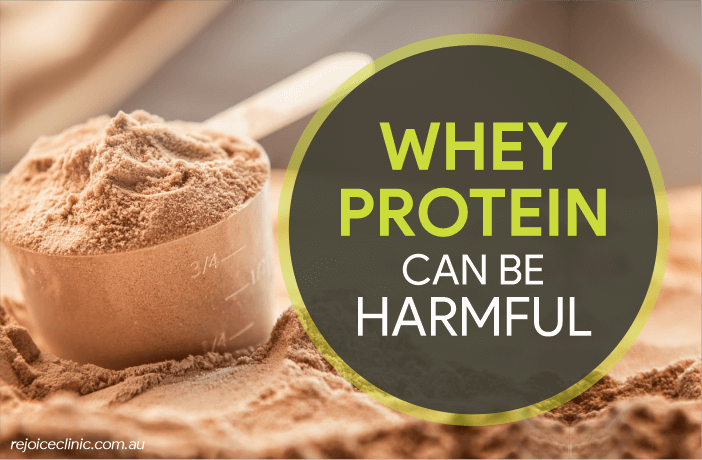Let us understand how excess intake of protein can be harmful and may cause Gout. The risk of your health could greatly depend on the kind protein diet you intake in your daily routine, and there are some high-protein foods also available that are saturated fat, and can raise the risk of heart disease as well. In case, you find gout due to excess intake of protein or other ways, you can contact us at the Ayurveda clinic in Melbourne.
It is completely fine to have a little extra protein, as long as you do keep doing regular exercise to absorb that protein to grow your muscles after the exercise. but if you eat too much, and do not exercise, then it can get be a problem for your body and may affect the kidney.
Let us understand deeply, what is whey protein and how it is linked to Gout-
It’s basically milk made up of two proteins-
1. Casein Protein, and;
2. Whey Protein.
Whey protein is the watery portion of the milk that separates from the curds when making cheese. Whey protein is considered a complete protein containing all 9 essential amino acids and it’s derived from cow’s milk which contains small amounts of purines.
A rich protein diet contains large quantities of purines. Purine is found in the human body naturally, but it’s also found in many other foods. Purines are a type of chemical compound found in foods and drinks that are part of a daily diet. A small number of foods contain concentrated levels of purines, eq. seafood, organ meats, and beer, etc.
How excess intake of Purine can increase Uric acid?
Uric acid is the end product of purine metabolism. Uric acid is produced by the body when it breaks down a chemical called purine. It’s then eliminated from the body through urine. A collection of uric acid crystals in the joints can cause certain health issues.
- A rich-protein diet typically contains large quantities of purines.
- A low-purine diet is an eating plan that limits foods with high purine.
So, Whey protein supplements usually come in the market in the form of powder. It also has high levels of lactoferrin, which helps the body heal quickly and is 20% of the protein found in milk. So, these Whey Protein supplements have a much higher concentration of protein. However, bodybuilders are instructed to take a more rich protein diet in their diet plan, but it must be done under the supervision of bodybuilder masters only.
Risk of taking whey proteins:
- In fact, whey is the best source of natural proteins. But, researches have shown that high-protein diets rich in red meats can increase the level of uric acid in the blood, which can result in painful crystals inside your joints and increases the risk of gout.
- High-protein diets can cause mild dehydration due to increased water loss through urine. Increased risk of dehydration puts the body under pressure.
- Additionally, high protein intake can also contribute to kidney stones.
How much protein should we take every day:
The daily dietary intake of protein depends upon your body weight, age, and health. For average sedentary man the average amount is 56g/day and for a woman is 46g/day.
- 0.84g/ kg of body weight for men
- 0.75 g/ kg for adult women
- Around 1.2- 2g/ kg of body weight for weightlifters, bodybuilders and athletes is recommended per day
After exercise, protein plays an important role to repair and grow the muscles. It is recommended within 30 minutes of exercise when your muscles are particularly receptive to protein synthesis.
Foods that are high in purine include:
- Fish, seafood- eq. shellfish, herring, mackerel, scallops, sardines, anchovies, etc
- Few types of meat such as red meat and offal, bacon, turkey, liver, beef kidney, and brain.
- Alcoholic beverages
Plant-based or Vegan protein diet (instead of shakes and non-vegan), Such as:
- Broccoli, 100% whole grain bread, brown rice and pasta
- Dairy products like milk, yogurt, and cheese
- Seeds, nuts, and vegemite
- Some grain and cereal-
- Beans and legumes (eq. lentils and chickpeas)
- Soy products like tofu
Add the above diet in your daily routine after working out, it will repair your muscles without raising uric acid and Yes, whey protein raises your uric acid levels. Also, weight loss can cause flare-ups if you are losing weight so quickly. Try to stick on plant-based or vegan protein and avoid protein shakes or whey protein. Plant-based protein will repair your muscles without raising uric acid as the whey protein does.
Dr.Anmol is profound in Ayurveda/Naturopath and has a great success rate in treating Gout patients. Feel free to drop a note or book an appointment.


Thanks for this inspirational and very well written article.
Thank you so much Lachelle Jagoe.
Dose drinking fresh whey cause gout and if so, what quantity ( if any ) can you drink a day
Great analysis, I love how you really went in-depth with everything it really projects what one needs to know about whey protein shakes causes gout. You have done an excellent job with this content I must say.
Hi Dr.Anmol, thank you for the post.
Please clarify on your recommendations to eat “Beans and legumes (eq. lentils and chickpeas) & Soy products like tofu”. From my (limited) knowledge, I understand that such products are a BIG no no for gout sufferers.